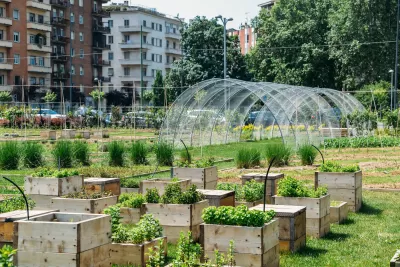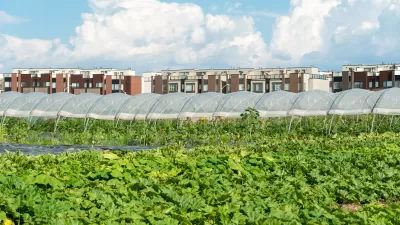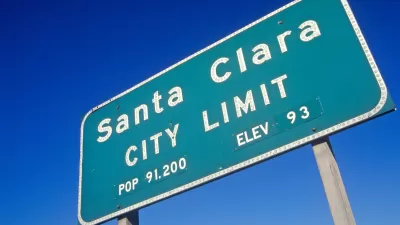Researchers looked at the carbon footprint of urban farming versus conventional, and the results were surprising.

Gardeners across the country are pushing back after recent findings from a study out of the University of Michigan suggested urban farming is less climate-friendly than conventional farming. “The research landed as cities including Detroit, Philadelphia, and Washington, DC, increasingly invest in urban agriculture to promote sustainability and become more resilient to the climate crisis,” reports Catherine Boudreau for Business Insider.
According to the study, fruits and vegetables grown on urban farms have on average six times the carbon footprint of produce from conventional farms. Critics of the study say its narrow focus on carbon emissions “overlooked the broader environmental harms of industrial-scale farming such as biodiversity loss and water pollution.” They are “worried the study would let conventional agriculture — which globally accounts for about one-third of greenhouse-gas emissions — off the hook and undermine a burgeoning movement to expand urban green spaces and promote food sovereignty,” Boudreau writes.
Researchers acknowledge that, while urban agriculture has myriad social benefits and 17 out of the 73 urban farms their team studied across the world did have lower footprints than conventional farms, the infrastructure used to build them and the crops grown on them make a difference. According to Business Insider, the research has led some urban gardeners to reevaluate their practices and incorporate a few of the best practices outlined in the study.
FULL STORY: Gardeners are fuming about a study that found produce from urban farms has a high carbon footprint

Planetizen Federal Action Tracker
A weekly monitor of how Trump’s orders and actions are impacting planners and planning in America.

Maui's Vacation Rental Debate Turns Ugly
Verbal attacks, misinformation campaigns and fistfights plague a high-stakes debate to convert thousands of vacation rentals into long-term housing.

San Francisco Suspends Traffic Calming Amidst Record Deaths
Citing “a challenging fiscal landscape,” the city will cease the program on the heels of 42 traffic deaths, including 24 pedestrians.

Amtrak Rolls Out New Orleans to Alabama “Mardi Gras” Train
The new service will operate morning and evening departures between Mobile and New Orleans.

The Subversive Car-Free Guide to Trump's Great American Road Trip
Car-free ways to access Chicagoland’s best tourist attractions.

San Antonio and Austin are Fusing Into one Massive Megaregion
The region spanning the two central Texas cities is growing fast, posing challenges for local infrastructure and water supplies.
Urban Design for Planners 1: Software Tools
This six-course series explores essential urban design concepts using open source software and equips planners with the tools they need to participate fully in the urban design process.
Planning for Universal Design
Learn the tools for implementing Universal Design in planning regulations.
Heyer Gruel & Associates PA
JM Goldson LLC
Custer County Colorado
City of Camden Redevelopment Agency
City of Astoria
Transportation Research & Education Center (TREC) at Portland State University
Jefferson Parish Government
Camden Redevelopment Agency
City of Claremont





























